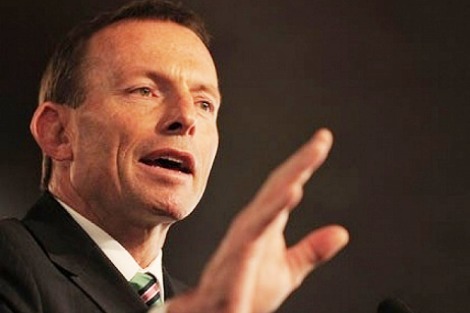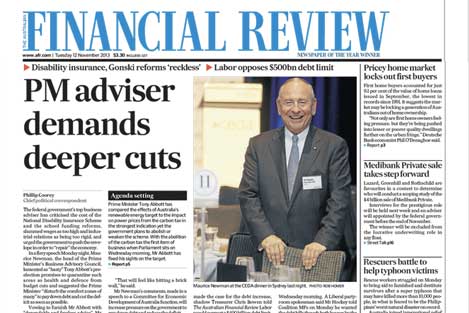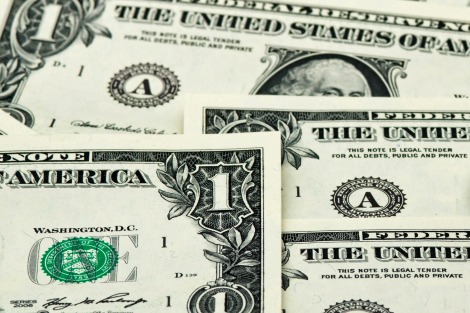Section: Economics
There are more than 200 results, only the first 200 are displayed here.
-

ECONOMICS
- David James
- 10 December 2013
15 Comments
It is hard not to smile over Woolworths' and Coles' 'voluntary' adoption of a code of conduct. Now that the duopoly has decided to mend its ways, it seems it can occupy the moral high ground and preach to everyone else. The Western world has been subject to a quarter of a century of propaganda about the virtues of deregulation. A closer consideration of the supermarket giants' promise to do the right thing offers little reason for confidence.
READ MORE
-

ECONOMICS
- Michael Mullins
- 25 November 2013
14 Comments
The prime minister said he 'sincerely regrets any embarrassment that recent media reports have caused' Indonesia's President Susilo Bambang Yudhoyono. Did he mean the media was doing its job and that the embarrassment was collateral damage? Or was he regretting that the media was out of line? Outspoken monarchist Professor David Flint says the government should retaliate against the ABC by reviewing the its overseas broadcasting contract.
READ MORE 
-

ECONOMICS
- Jean-Paul Gagnon
- 18 November 2013
15 Comments
What if citizens were given the chance to fill out a preference form online as part of their own personal, digital tax portal? You could choose to pick 'below the line' and individually choose what your tax money can and can't be spent on. For example you might like to spend on funding public schools, the bullet train, hospital supplies and museums, and not to spend on nuclear power plants, weapons development, or the automotive industry subsidy.
READ MORE 
-

ECONOMICS
- Michael Mullins
- 18 November 2013
2 Comments
Dr Maurice Newman is chairman of the Prime Minister's Business Advisory Council. It's his job to lobby for big business against, as it happens, the common good. But he is criticised even among some of his peers in the business world, particularly for his unwillingness to accept the need for a reduction in carbon emissions. Does Tony Abbott really listen to 'a range of voices' on business, as he claims?
READ MORE 
-

ECONOMICS
- David James
- 05 November 2013
2 Comments
Australia is very much the 'Noah's Ark' economy: two of everything. Consider the spate of industry sectors in which only two companies dominate: airlines (Virgin and Qantas); paper and packaging (Visy and Amcor); print media (News Corporation and Fairfax). The Federal Government's announcement that it will be launching a 'root and branch' review of Australia's competition law will, at the very least, make for a fascinating spectacle.
READ MORE 
-

ECONOMICS
- David James
- 04 October 2013
1 Comment
America is fond of claiming exceptionalism, which is usually little more than an indication of its attitude to moral accountability. But in one area America definitely is exceptional: the global currency markets. There is no risk of the market for American dollars drying up, which means that a default by the American government is, while significant, not especially relevant to what happens with the global trade in US dollars.
READ MORE 
-

ECONOMICS
- David James
- 06 September 2013
4 Comments
Two of the most important issues to have been given scant attention in the election campaign are ageing and property. Even less noticed is the inter-relationship between the two. The effect of ageing on property prices will be arguably the most important financial challenge facing Australian governments over the coming decades.
READ MORE 
-

ECONOMICS
- David James
- 27 August 2013
3 Comments
Australia is one of only a few countries in the world that has a franking credit system. Though it is designed to stop 'double taxation' on company tax, in many cases it ends up being a 'double reward' for entities that already have tax favoured status. Last year the Tax Commissioner generously refunded over $500 million to charities and not-for-profits on dividends because they pay no tax.
READ MORE 
-

ECONOMICS
- David James
- 13 August 2013
3 Comments
As the China boom fades Australia is experiencing a delayed version of the GFC, without the banking crisis. Until now we've been reasonably well served by both sides of politics, in terms of macro-economic strategy. Now we require a way of dealing with more mundane economic issues like productivity and efficiency. Neither side has many good ideas about how to achieve the required structural shifts.
READ MORE 
-

ECONOMICS
A currency's value is supposed to represent the state of the country's underlying economy. Yet very little changed about the Australian economy during a week in which the value of the dollar was substantially altered. It is a small instance of how rapidly change occurs in currency markets, sometimes to devastating effect, and another reason why the capital markets are ruling rather than serving.
READ MORE 
-

ECONOMICS
Religious authorities may not spend a lot of time pondering the nature of global financial systems, but the Pope's recent comment that 'money has to serve, not rule' suggests it can be useful when they do. Given scope to become rule makers, rather than just people who know how to exploit the rules, financiers have moved themselves to a position of mastery.
READ MORE 
-

ECONOMICS
In The Big Bang Theory Sheldon invents a game of chess which 'utilises a three-sided board with transitional quadrilateral-to-triangular tessellation to solve the balanced centre combat-area problem'. This gobbledegook sounds suspiciously similar to the application of mathematical models to financial securities in derivatives markets.
READ MORE 